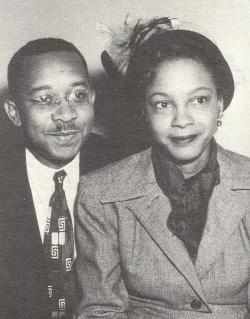Why Study Sociology?
Why Study Sociology?
When Elizabeth Eckford tried to enter Central High School in Little Rock, Arkansas, in September 1957, she was met by an angry crowd. But she knew she had the law on her side. Three years earlier in the landmark Brown vs. the Board of Education case, the U.S. Supreme Court had overturned twenty-one state laws that allowed blacks and whites to be taught in separate school systems as long as the school systems were “equal.”

Figure 1.9 The research of sociologists Kenneth and Mamie Clark helped the Supreme Court decide to end “separate but equal” racial segregation in schools in the United States. (Photo courtesy of public domain)
When Elizabeth Eckford tried to enter Central High School in Little Rock, Arkansas, in September 1957, she was met by an angry crowd. But she knew she had the law on her side. Three years earlier in the landmark Brown vs. the Board of Education case, the U.S. Supreme Court had overturned twenty-one state laws that allowed blacks and whites to be taught in separate school systems as long as the school systems were “equal.” One of the major factors influencing that decision was research conducted by the husband-and-wife team of sociologists, Kenneth and Mamie Clark. Their research showed that segregation was harmful to young black schoolchildren, and the Court found that harm to be unconstitutional.
Since it was first founded, many people interested in sociology have been driven by the scholarly desire to contribute knowledge to this field, while others have seen it as way not only to study society but also to improve it. Besides desegregation, sociology has played a crucial role in many important social reforms, such as equal opportunity for women in the workplace, improved treatment for individuals with mental disabilitiess or learning disabilities, increased accessibility and accommodation for people with physical handicaps, the right of native populations to preserve their land and culture, and prison system reforms.
The prominent sociologist Peter L. Berger (1929– ), in his 1963 book Invitation to Sociology: A Humanistic Perspective, describes a sociologist as “someone concerned with understanding society in a disciplined way.” He asserts that sociologists have a natural interest in the monumental moments of people’s lives, as well as a fascination with banal, everyday occurrences. Berger also describes the “aha” moment when a sociological theory becomes applicable and understood:
[T]here is a deceptive simplicity and obviousness about some sociological investigations. One reads them, nods at the familiar scene, remarks that one has heard all this before and don’t people have better things to do than to waste their time on truisms—until one is suddenly brought up against an insight that radically questions everything one had previously assumed about this familiar scene. This is the point at which one begins to sense the excitement of sociology. (Berger 1963)
Sociology can be exciting because it teaches people ways to recognize how they fit into the world and how others perceive them. Looking at themselves and society from a sociological perspective helps people see where they connect to different groups based on the many different ways they classify themselves and how society classifies them in turn. It raises awareness of how those classifications—such as economic and status levels, education, ethnicity, or sexual orientation—affect perceptions.
Sociology in the Workplace
Employers continue to seek people with what are called “transferable skills.” This means that they want to hire people whose knowledge and education can be applied in a variety of settings and whose skills will contribute to various tasks. Studying sociology can provide people with this wide knowledge and a skill set that can contribute to many workplaces, including an understanding of social systems and large bureaucracies; the ability to devise and carry out research projects to assess whether a program or policy is working; the ability to collect, read, and analyze statistical information from polls or surveys; the ability to recognize important differences in people’s social, cultural, and economic backgrounds; skills in preparing reports and communicating complex ideas; and the capacity for critical thinking about social issues and problems that confront modern society. (Department of Sociology, University of Alabama)
